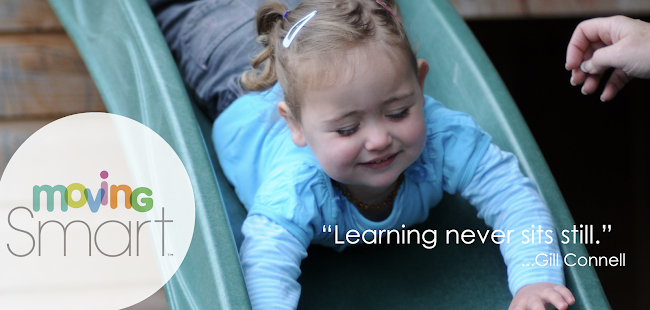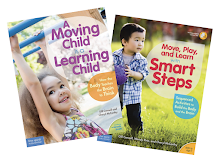Stress has been on my mind these past few days since the earthquake hit here in Christchurch. And I can’t help thinking about what effects this disaster is (or will be) having on the children, including my two year old granddaughter Caitlin. Loving parents and attentive caregivers such as the teachers I met that day at Westburn School will go a long way to helping the children overcome the jolt of trauma they felt on Tuesday. But the lasting effects on young, developing minds is something we’re all going to have to watch for carefully.
Earthquakes aside, the topic here is stress, and it can come in many forms, leaving a lasting, negative imprint on children’s early development. Indeed, there is a body of research that shows just how important it is to provide a calm and loving environment in order to help insure children’s emotional and social well-being, and surprisingly, children’s CAPACITY TO LEARN. Here’s how it works...
THE SCIENCE OF STRESS
Scientists studying stress have shown that when a human being feels threatened – physically or emotionally – a chain reaction of chemicals is released in the brain and sent coursing through the body. In doing this, the brain is fulfilling it’s first, primary function – survival.
You see, stress hormones such as adrenalin and cortisol are the body’s physiological alarm bell signaling danger. And it doesn’t matter whether that danger is defined as an earthquake, a public speaking engagement, a bad report card, or a boo-boo. The body responds physiologically pretty much the same way every time.
So here’s what happens. When these hormones are triggered, the brain goes into a primitive state known as “fight or flight,” pouring nearly all of its energy back down into the brain stem – the area that controls automated functions such as breathing and heart rate. At the same time, the senses are heightened and blood rushes into the muscles (which feels like shivering) in readiness to “fight” or “flee” the danger.
Earthquakes aside, the topic here is stress, and it can come in many forms, leaving a lasting, negative imprint on children’s early development. Indeed, there is a body of research that shows just how important it is to provide a calm and loving environment in order to help insure children’s emotional and social well-being, and surprisingly, children’s CAPACITY TO LEARN. Here’s how it works...
THE SCIENCE OF STRESS
Scientists studying stress have shown that when a human being feels threatened – physically or emotionally – a chain reaction of chemicals is released in the brain and sent coursing through the body. In doing this, the brain is fulfilling it’s first, primary function – survival.
You see, stress hormones such as adrenalin and cortisol are the body’s physiological alarm bell signaling danger. And it doesn’t matter whether that danger is defined as an earthquake, a public speaking engagement, a bad report card, or a boo-boo. The body responds physiologically pretty much the same way every time.
So here’s what happens. When these hormones are triggered, the brain goes into a primitive state known as “fight or flight,” pouring nearly all of its energy back down into the brain stem – the area that controls automated functions such as breathing and heart rate. At the same time, the senses are heightened and blood rushes into the muscles (which feels like shivering) in readiness to “fight” or “flee” the danger.
Now, because of this rush of focus down into the brain stem, the brain has difficulty accessing the cortex – the higher region of the brain that governs thinking and executive function. If you’ve ever felt highly stressed or scared you may remember feeling an inability to think clearly. And in fact, that’s exactly what’s happened, because your brain, without your permission, went on “automatic survival pilot.”
STRESS INTERRUPTS LEARNING
Of course, I’m thumbnailing years of essential research here into a few paragraphs, but the long and the short of it is this: when we are under stress the thinking part of our brain is more or less de-activated. And when we can’t think, we can’t learn.
Further, when cortisol is present in the system for prolonged periods, science has shown it may have long-term damaging effects including depressed immune responses which can effect health, and memory impediments which can impact learning.
Consider it this way: a child under emotional or physical stress means a brain closed off to higher, cognitive functions, while a happy, relaxed child means a brain open to new ideas, immersive learning experiences, and creative problem solving.
So, the next question is, what is stress for little ones?
DEFINING STRESS
Children are small, vulnerable, dependent, needs-driven creatures. Without years of experience in understanding the world around them, they stress easily (hence, all the crying) over a variety of factors, including hunger, discomfort/pain, separation, and both instinctual and acquired fears. As a parent or caregiver, managing these stresses through all of their developmental stages is an essential part of helping your child grow and learn to their highest cognitive, emotional, social, and physical potential.
AT FIRST…
For newborns and infants, I believe there’s only one approach: meet your child’s every need. Making sure she is well fed, warm, dry, comfortable, and connected to you (especially when she is in need) is essential for controlling newborn stress levels. There are theories that babies should be left to cry in order to learn to self-calm. But the physics simply don’t work in my opinion. The more stress hormones that build up in their tiny bodies, the harder (and longer) it will take to calm down.
Further, even the youngest babies can read your stress levels, so managing your stress is equally important. If you are calm and confident, your child is more likely to be relaxed, because just as in all relationships, emotions fuel emotions, positively or negatively. And while I realize staying level and calm around your child is not always easy, it never pays to add fuel to her “stress fire.”
SELF-CALMING
As your child grows and is better able to communicate, she may now be entering a time when she can begin to explore the power to calm herself in times of stress – an essential step on the road to developing independence and self-confidence. Experts call this self-calming.
As your child grows and is better able to communicate, she may now be entering a time when she can begin to explore the power to calm herself in times of stress – an essential step on the road to developing independence and self-confidence. Experts call this self-calming.
For instance, I’ve seen parents react when a little one trips and falls, encouraging them by saying, “You’re OK,” as the child gets back to her feet. And while I applaud the encouragement, the challenge I see is that the child isn’t given the opportunity to assess her own “Okness.”
Instead, I recommend parents try a slightly different approach. Rather than say, “You’re OK,” ask her, “Are you OK?” This does three things:
1. It respects your child’s ability to assess her own feelings
2. Shows her you have confidence in her and builds self-esteem
3. Reassures her you’re right there if she decides she needs you.
Stress is a fact of life, and helping your child learn to cope with her feelings is a balancing act you will play out time and again. And no, the two of you aren’t going to get it right every time. But instilling confidence in her while making sure she knows you’re always there when needed, is the best start you can give her down the road to independence, and the ability to manage stress in multiple situations, with or without you.
Helping children calm down from a stressful moment in the day takes love and attention. And sometimes you can even help the process along with a little humor.
Next time your little one’s Grin goes missing, try this game. As you recite the poem, search all over your child (and add a little tickle here and there) and before you know it, that grin will come running back! Note: please, feel free to make up your own words to match whatever fits your particular situation!
And after you’ve found your child's Grin, reverse roles and have her find yours!
Finding Grin
Oh, where did Grin go?
I do miss him/her so.
Did he/she flap like a crow?
Is that him/her on your toe?
Did he/she buzz like bee?
Is that him/her on your knee?
Did he/she hop like a bunny?
Is that him/her on your tummy?
Oh, wait!
Now I see.
Here he/she comes!
Right towards me!
Welcome back,
Great big Grin!
Right at home
Above your chin!















Thank you for highlighting the negative effects of stress on the developing brain, and yet highlighting ways to nurture resilience and model for our children ways to listen to our own unique stress responses/sensitivity. I am loving what you have to share about the importance of physical movement, especially in early childhood, and will look forward to what you may have to say about movement throughout a child's developmental spectrum, especially during adolescence when a whole new rewiring of the brain occurs! Keep up the inspiring and educational posts! I especially like how much you are encourage physical courage and development www.lionswhiskers.com
ReplyDeleteI think your underlying message on handling stress is communication, i.e. being there for your kid. That is an enormous piece of good advice - and that message goes right through life, keeping the doors of communication open even when kids become teenagers and beyond. As they get older you don't have to be physically in their presence all the time but they need to know they can come to you, you can talk together and whatever they say you will respect them and their opinions, and in turn they will respect you and your opinions. We all have our failings but if we are there for each other (on email, a phone message or in person) stress is less, bonds are strengthened, and children are empowered. - And it all starts when they are small.
ReplyDeleteI love your practical ideas of how to communicate positively with your little ones, while building respect and self confidence. Cheers.
Thank you for offering such a succinct distillation of this incredibly important research!
ReplyDeleteGreat post. Stress easily translates to sickness and physical pain in small children. And many studies have shown the effects of maternal stress and/or depression on young children and infants. Part of helping our children is taking care of ourselves...it's important for kids to see that help is available for the whole family when needed. Particularly following trauma or extreme stress.
ReplyDeleteLovely post, Gill! Sadly, so much undue stress is put on children by well-meaning parents. Too many structured activities,too much shuffling around from place to place, push to achieve academically and learn in unnatural ways. The blur of wanting the best for today's children is putting them on a fast track that leaves them stressed and exhausted.
ReplyDelete- Bethe @balmeras
Love the poem. TY.
ReplyDeleteGill, I enjoyed your article. It saddens me to think of the harm done to so many children due to the stress of bullying in schools. If the kids could only understand the true damage they do by causing so much stress on others, perhaps they would change.
ReplyDeleteThanks for sharing such a nice blog with us.I like your blog very much lots of information provides in it.for more details regarding effects of stress visit my blog.
ReplyDeleteIn response to Tracey Best, posting above: It's not the kids that bully that need to change, they are children after all, but the so-called adults in their lives. So often it is abuse and bullying at home that creates the bully at school. Your points, Gill, are well taken. I left an abusive situation with my kids and both became seriously ill from the stress of being homeless. I, myself, developed Lupus, which created a whole other level of stress for them throughout their lives. Thankfully they came through it all quite well but how the adults in their lives deal with ANY stress is the most critical part of a child's development. Thank you for your post.
ReplyDelete